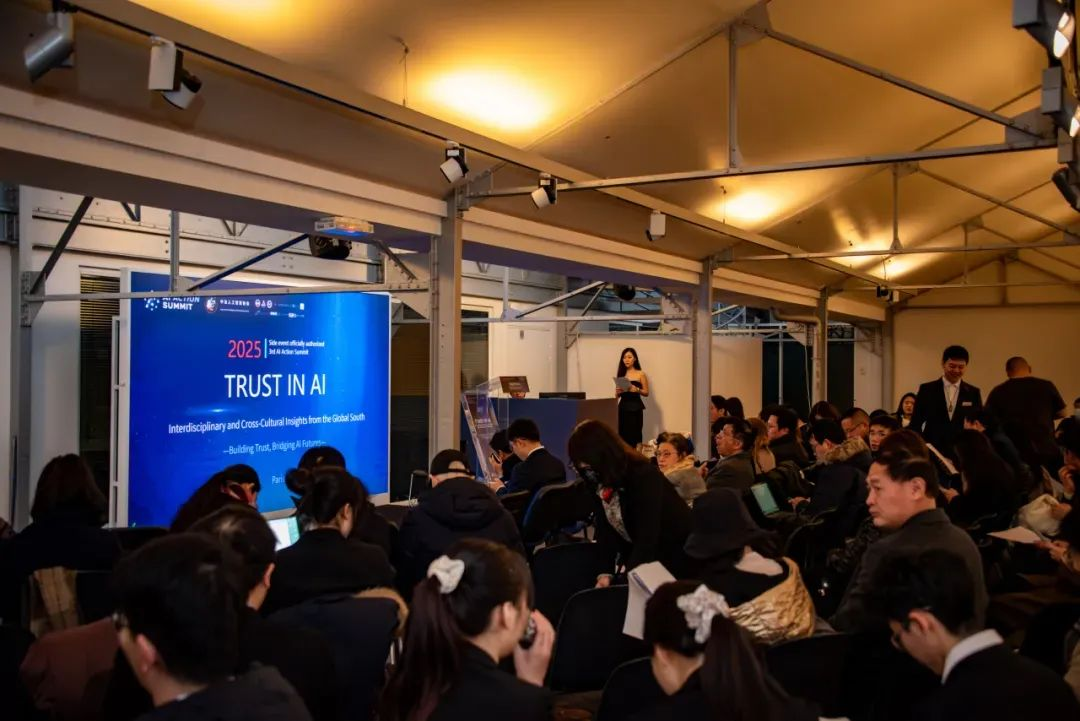On February 11th local time, the official session of the 3rd Global AI Action Summit, titled "Trust in AI: Intercultural and Interdisciplinary Insights from the Global South," was successfully convened at the European Times Cultural Center in Paris. Hosted by the Sino-French Association for Artificial Intelligence, the summit facilitated in-depth dialogues among representatives from academia, industry, and international organizations across Europe, East Asia, Southeast Asia, and Africa. Discussions centered on critical themes including AI governance paradigm innovation, ethical frameworks for sustainable development, and the boundaries of corporate innovation, collectively advancing the global AI governance discourse within a multicultural context.

The Artificial Intelligence Institute of Wuhan University participated as a distinguished representative of China's academic community, actively contributing to the exchanges. During the conference, the institute joined forces with leading domestic and international academic institutions and enterprises to showcase cutting-edge AI research achievements and innovative applications. Live demonstrations of technological solutions were conducted, followed by substantive exchanges in specialized domains such as intelligent computing, digital forensics, educational technology, software innovation, and medical AI. These collaborative efforts were designed to deepen industry-academia-research integration while generating novel perspectives for AI technological development and implementation.

The event featured addresses by prominent figures including Mr. Tan Colling, President of the Sino-French Artificial Intelligence Association; Mr. Huang Jin, the Association's Honorary President and recipient of France's National Order of the Knight; and Mr. Zhong Cheng, President of European Times Cultural Media Group and Publisher of European Times. In his remarks, Mr. Tan Colling articulated a vision to "paint a more humanistic future for artificial intelligence, with Paris as our starting canvas." Mr. Huang Jin emphasized that "the convergence of machine intelligence and human wisdom requires polyphonic cultural narratives to compose a trustworthy technological paradigm." Mr. Zhong Cheng underscored the media's pivotal role as an informational bridge in dismantling barriers within AI governance dialogues.

Keynote presentations and industrial innovation roundtables saw experts engage with pressing issues such as governance frameworks for AI and emerging technologies, copyright protection of AI-generated content (AIGC), AI entrepreneurship case studies, sustainable development pathways, and safety protocols with associated educational initiatives. A shared consensus emerged recognizing that while AI development presents unprecedented opportunities, it simultaneously introduces complex ethical, social and economic challenges. Participants affirmed that strengthened international cooperation, coupled with enhanced transparency and inclusivity, will prove indispensable in harnessing AI as an engine for equitable societal progress.

Established in December 2024 under the leadership of Academician Zhang Pingwen—President of Wuhan University and member of the Chinese Academy of Sciences, who serves as its inaugural dean—the Wuhan University School of Artificial Intelligence has concentrated its mission on cultivating talent and advancing research in AI foundational theories and interdisciplinary applications. The institution is committed to constructing an internationally influential disciplinary architecture that pioneers AI's cutting-edge convergence domains while establishing itself as a preeminent talent incubator, innovation hub, and empowerment platform for high-quality AI development. In alignment with its strategic expansion and team-building objectives, the School now extends ongoing invitations to exceptional scholars worldwide specializing in AI's mathematical and physical foundations, data science, machine learning, computer vision, natural language processing, multimodal large models, embodied intelligence, scientific AI, social intelligence, and related fields.
